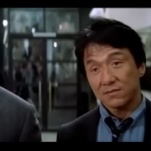I am a grown-ass man, and I really enjoy this show about cartoon ponies, which is ostensibly made for 6-year-olds.
It seems like literally every article about the series My Little Pony Friendship Is Magic must begin with a lengthy treatise on the “brony” subculture, one of those Internet things that gets a raised eyebrow, a shaken head, and a polite chuckle on Good Morning America. (If you say “brony” three times, you will summon them. I’ve got one to go.) There have been numerous attempts to theorize just why this show has been so embraced by adults—but particularly by adult men—when it would seem like it shouldn’t have done so at all. Articles about the topic are always a little disbelieving, when they’re not coated in superiority and scorn. And, yeah, any time someone’s an intense fan of something, it can be a little creepy, and yeah, this is not exactly where you’d expect that particular audience to turn up and get obsessive, but here the ponies are and here we are.
Let me offer an alternate explanation: Sincerity is a dying art in our culture. It’s really hard to do a story where, say, the power of love saves everybody’s lives, because that’s the sort of thing that’s just not done anymore. We’re past that. We’re beyond cynical and well into jaded. We stopped believing in the sorts of good, old-fashioned, hyper-earnest values so much of our entertainment used to be based on somewhere in the 1960s and probably even earlier than that. That’s probably good. Love doesn’t really last forever, and you can’t change the world simply by trying to be a good person, and everybody’s going to die, whether we like it or not. Approaching the world with just a touch of jaded cynicism is recommended for all.
But what’s wrong with wanting to believe all of the above things are lies? What’s wrong with telling our kids that there’s nothing more wonderful than the moment when someone says they’ll love you forever, even if that’s an impossibility, given who we are? What’s wrong with telling them that doing good things is something that will have impact far beyond yourself and your immediate friends and neighbors? And what’s wrong with believing in these things just a little bit yourself? It’s like those newspaper columns you see every Christmas, where somebody tries to argue that Santa’s really real so long as we keep his spirit in our hearts. We know it’s bullshit, and we return to thinking so on December 26, but why not spend a little time dwelling on the better parts of our natures?
At its best, My Little Pony is like an owner’s manual to being a kind person. Making friends is something kids can struggle with, so the series boils it down to its most basic elements, showing all of us how a kind gesture or two or three will go a long way. It’s also become in its second season (when it became legitimately the best show for kids on TV right now) a series about the painful uncertainties of growing up. When you look at older siblings or teenagers as a kid, you can’t quite understand who they are. You know who they are, sure, since you grew up next to them, but a wall has gone up between the two of you. They’re on one side of puberty, and you’re on the other. You can still relate to each other, but the gulf is going to get wider and wider, until it abruptly snaps back into place, with all the pain that causes.
Put another way: There’s a beautiful passage in P.L. Travers’ novel, Mary Poppins, that’s all about the youngest Banks babies. As it turns out, in Travers’ world, babies who cannot yet speak possess the ability to understand and converse with all manner of non-human objects, up to and including the wind and other natural forces. Once babies learn to speak, they lose their ability to communicate with non-humans. Language becomes that wall, tearing them away from the simplicity of their infancy and putting them in a new world with new rules. When the Banks babies learn this, they begin to weep, so unsettled are they. But to a kid, that’s what growing up is, this horrifying process in which others around you seem to launch up out of childhood in an instant, and you know you will at some point, too.
What My Little Pony does is insist that it’s okay to want to grow up, but it’s also okay to want to be a kid. The six central ponies in the series are already working their way toward who they’ll be as adults, but they’re also struggling with the fact that they don’t yet understand everything their older counterparts do. Today’s season finale is a great example of this. In it, main character Twilight Sparkle’s previously unmentioned older brother sends her an invitation to his wedding, one she didn’t previously know about. Needless to say, she’s angry about this, and needless to say, she has to sing about how her “big brother best friend forever” was someone she thought she could count on. (The songs—by composer Daniel Ingram—are one of the best things about this show.) By the time she gets to Equestria to celebrate his wedding, she’s been stewing in how she could be so overlooked. She’s overjoyed when she finds out he’s marrying Princess Cadance, her old foal-sitter (I know, I know), but less overjoyed when Cadance doesn’t seem to be… quite right.
The visual pleasures of the series are completely obvious at first blush. The bright colors and beautiful backgrounds contrast nicely with the more simplistic Flash animation that drives the program. There’s a fight sequence in the finale—in which the six ponies face off with a horde of changelings who can morph into anything they want (including our heroines)—that’s as colorful and fun as anything I’ve seen on any TV program this season. (When it pops up on YouTube inevitably, even those who are skeptical of the show should probably check it out.) The villain sings a song in the second hour—intercut with singing from the real Cadance (discovered deep beneath Equestria by Twilight Sparkle)—that has the feel of one of those classic villain songs from a Disney movie. And the final wedding sequence is bouncy and fun, filled with real joy and heart.
Yeah, this is still a show where the power of love conquers all. (Once the real Cadance is back at the side of her fiancé, she uses her love for him to power up his magical ability to force the changelings out of Equestria.) But it’s a show where the sheer, earnest hope that such a thing might be true carries you over the innate cynicism you’ll probably have about the very idea. My Little Pony acknowledges to its target audience of 6-year-old girls that, yes, they can be anything they want to be, be that the more athletic Rainbow Dash or the fashion-oriented Rarity. But at the same time, the series acknowledges that this idea is a little bit scary, that growing up is an isolating thing that can make you feel all alone, that it’s sometimes hard to make friends and just as hard to keep them. Yet buried down within that is a message that cuts across all ages: If we just tried to be a little bit better to each other, wouldn’t everything run that much more smoothly? That’s a language both kids and their parents can speak.
“Brony.”







































